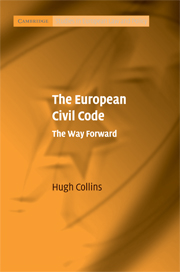Book contents
- Frontmatter
- Contents
- Preface
- Series editors' Preface
- Table of cases
- Table of treaties and legislation
- I Civil society and political union
- II The acquis communautaire in private law
- III The hidden code
- IV Private law and the Economic Constitution
- V Cultural diversity and European identity
- VI Respecting legal diversity
- VII Multi-level private law
- VIII Strengthening convergence
- IX Exploring the European Social Model
- Index
- CAMBRIDGE STUDIES IN EUROPEAN LAW AND POLICY
- References
VI - Respecting legal diversity
Published online by Cambridge University Press: 26 February 2010
- Frontmatter
- Contents
- Preface
- Series editors' Preface
- Table of cases
- Table of treaties and legislation
- I Civil society and political union
- II The acquis communautaire in private law
- III The hidden code
- IV Private law and the Economic Constitution
- V Cultural diversity and European identity
- VI Respecting legal diversity
- VII Multi-level private law
- VIII Strengthening convergence
- IX Exploring the European Social Model
- Index
- CAMBRIDGE STUDIES IN EUROPEAN LAW AND POLICY
- References
Summary
In some European academic bedrooms, dreams are dreamed not only of a European ius commune but even of a European Civil Code. It is thought that such a Code could build bridges between Member States and support a common European identity. It is, however, generally agreed that no legal basis exists for such a European Code
With these pithy remarks, Cees van Dam, an expert in comparative tort law in Europe, dismisses the various projects for a European Civil Code. He rejects these proposals as completely impracticable because of the diversity of current private law systems. He is right to stress that currently European private law systems differ significantly. We can also acknowledge that some of this divergence between laws may be linked to broader cultural, social and economic differences at the national level. But my argument has been that at the level of principle, there is sufficient common ground to permit further progress towards building a common European identity around general laws. The fact that there is no agreement on the details and even some broader standards at present does not necessarily preclude the possibility of future rapprochement and a developing unity of principles.
Yet it must be admitted that legal diversity between national private law systems does pose some serious questions about the viability of the project of developing a European Civil Code. By creating a common set of European rules and principles in private law, a civil code would confront every national legal system with a serious challenge.
- Type
- Chapter
- Information
- The European Civil CodeThe Way Forward, pp. 146 - 181Publisher: Cambridge University PressPrint publication year: 2008

